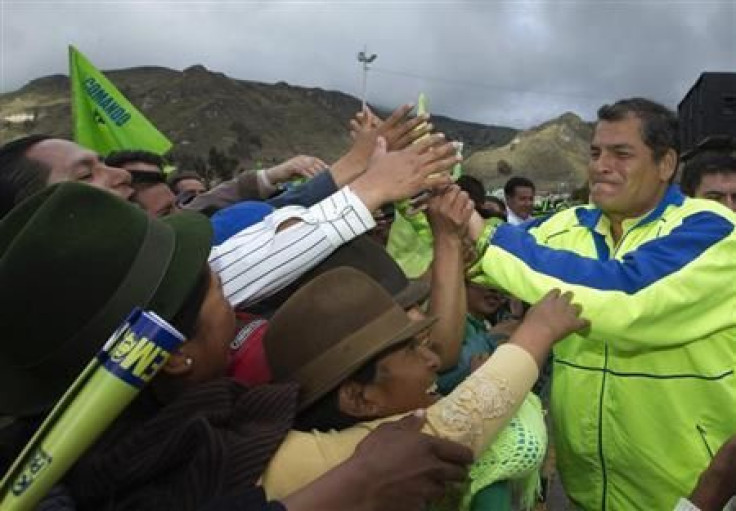US VP Biden Had ‘Cordial’ Talk With Ecuador President Correa: Is Ecuador Cooling To Idea Of Granting Accused Spy Snowden Asylum?

Calling U.S. Congress members “brats” for their blustering to harm Ecuador-U.S. trade relations should the country grant National Security Agency leaker Edward Snowden political asylum, Ecuador’s President Rafael Correa characterized a phone conversation with U.S. Vice President Joe Biden on Saturday as “cordial” and “courteous.”
The Ecuadorian socialist leader, who was re-elected to office in February, has been a spotlighted player in the show about where Snowden will end up if he’s not nabbed by U.S. authorities to be tried for espionage because of his leaking information about massive U.S. electronic surveillance of its own people.
Ecuador has been hosting Australian WikiLeaks founder Julian Assange at its embassy in London since June 19 of last year, and it subsequently granted him political asylum. The country has said it would consider affording Snowden the same protection if he can make it to Ecuador or one of its foreign missions.
In the latest development, Correa said Saturday he had a “cordial” and “courteous” conversation with the American vice president, who asked that Ecuador back out of considering providing Snowden refuge, Reuters reported.
Correa employed his weekly televised address to the nation to lash out at U.S. Congress members for their calls to withdraw Ecuador’s preferential trade status: The U.S. is Ecuador’s biggest trade partner.
On Wednesday, U.S. Sen. Robert Menendez, D-N.J., chairman of the Senate Foreign Relations Committee, said that if Ecuador granted asylum to Snowden, then he would lead efforts to prevent the renewals of Ecuador’s duty-free access to U.S. markets under the Generalized System of Preferences program and of the Andean Trade Promotion and Drug Eradication Act: Both would expire by the end of next month unless renewed, as Reuters said. Ecuador responded by unilaterally renouncing the trade benefits, saying it would not be blackmailed by political posturing.
Ecuador sends 35 percent of its exports to the U.S., worth about $6.5 billion, according to the Observatory of Economic Complexity at the Massachusetts Institute of Technology.
Meanwhile, Ecuador withdraw on Friday Snowden’s temporary travel documents that would have allowed him to leave Moscow’s Domodedovo International Airport, where the leaker of U.S. electronic-surveillance documents is believed to be staying in a political no man’s land reserved for in-transit travelers who do not have permission to enter Russian territory.
According to official Ecuadorean correspondence acquired by the Spanish-language network Univision, the reason for the withdrawal of the paperwork is that Quito is concerned that Assange is overstepping his bounds with regard to facilitating Snowden’s passage to refuge. Ecuador’s ambassador to the U.S., Nathalie Cely, told the president’s office that, to the international community, Assange “appears to be running the show,” according to the Guardian.
© Copyright IBTimes 2024. All rights reserved.












